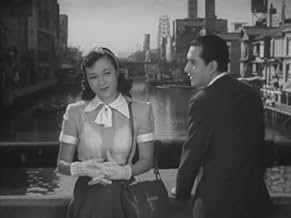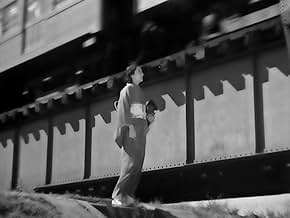Michiyo vit dans une petite maison à Osaka et n'est pas heureuse dans son mariage : tout ce qu'elle fait, c'est de cuisiner et laver le linge pour son mari.Michiyo vit dans une petite maison à Osaka et n'est pas heureuse dans son mariage : tout ce qu'elle fait, c'est de cuisiner et laver le linge pour son mari.Michiyo vit dans une petite maison à Osaka et n'est pas heureuse dans son mariage : tout ce qu'elle fait, c'est de cuisiner et laver le linge pour son mari.
- Réalisation
- Scénario
- Casting principal
- Récompenses
- 9 victoires au total
Avis à la une
There is no plot, just the point that Hara's character feels trapped in a boring marriage as she leads a mundane existence. There's no real action, no intense conflict--at least none that isn't internal. This is purely a character study and psychological look into a failing marriage.
I will say that the movie, in my opinion, does an excellent job at reminding us that marriage is meant to be forever but that doesn't mean it will always be a source of joy. It's just like life, in general--it's a mix of pleasant and unpleasant and, yes, even mundane experiences. And I tip my hat to the director for expressing that so keenly.
But the truth is, I wanted to stop watching halfway through because I was bored. I kept watching, though, because of Hara. What an amazing actress she was.
There is a lovely bit of feminism in how this film shows how unfair traditional society is, with a woman expected to be subservient to a man's needs and put up with him staying out late getting drunk. Ironically, all of the friends of the wife (Setsuko Hara) tell her how lucky she must be being "happily married," while she suffers behind a smile or casting down her eyes. When they ask her what she talks about with him, she replies simply that she has a cat. While she carefully manages the household finances, he goes out and buys a fancy pair of shoes, seemingly oblivious. It's infuriating to watch, and when his spoiled niece (Yukiko Shimazaki) turns up looking for a place to stay, things get worse, as she now has two loafers around the house.
The scenes in Osaka that Naruse gives us are as beautiful as the two leading ladies, making the film a visual treat. There is also a depth of feeling to what Hara's character is going through, and that's what made the film for me. At the outset of the film she asks "I had hopes and dreams before. Where have they gone?" and "With a life restricted to the kitchen and the family room, must every woman grow old and die feeling empty?" It was liberating to see her take action and leave for Tokyo, not writing her husband (or sadly, being written to).
The husband (Ken Uehara) is a better person around his niece, and weirdly we see flirtation between the two, as well as a cousin of the wife's lightly hitting on her. They both know to draw the line at adultery though, and while the film is certainly showing the husband in a negative light, it seems to be saying more that these are two average, decent people in a marriage, and cautioning husbands to treat their wives better. Bravo for that, but at the same time, the "stand by your man" aspect definitely didn't work for me 70 years later. He's aware she's had a hard time, but not aware of his own role in that, and how he's taken her completely for granted. It makes for an unsatisfying finish, but for the things it was able to accomplish in 1951, I liked it.
Michiyo is at first welcoming when Hatsunosuke's niece Satoko (Yukiko Shimazaki) comes to visit but soon becomes annoyed and jealous when her husband takes her on a tour of Osaka and pays an inordinate amount of attention to her charms. When her dissatisfaction becomes crystallized, she decides to return to Tokyo to visit her mother (Haruko Sugimura). She is torn between wanting to find a job and remaining separated or returning to her husband to continue with the struggle. She writes a letter to Hatsunosuke ostensibly to say she will not return but it is never mailed. The way her ambivalence is resolved will cause some consternation for modern day women's rights advocates, but seems appropriate under the circumstances and I left the theater feeling elated.
Le saviez-vous
- AnecdotesThis film revived the shomingeki sub-genre in which lower middle class and struggling families are depicted.
- Citations
Michiyo Okamoto: [voiceover] My husband is sitting at the table. I bring a pot of miso soup from the kitchen. Yesterday, today, and tomorrow, for 365 days a year, morning and night, come and go unvaryingly. With a life restricted to the kitchen and the family room, must every woman grow old and die feeling empty?
- ConnexionsReferenced in Century of Cinema: Un siècle de cinéma japonais, par Nagisa Oshima (1995)
Meilleurs choix
Détails
- Durée1 heure 37 minutes
- Couleur
- Mixage
- Rapport de forme
- 1.37 : 1
Contribuer à cette page






























